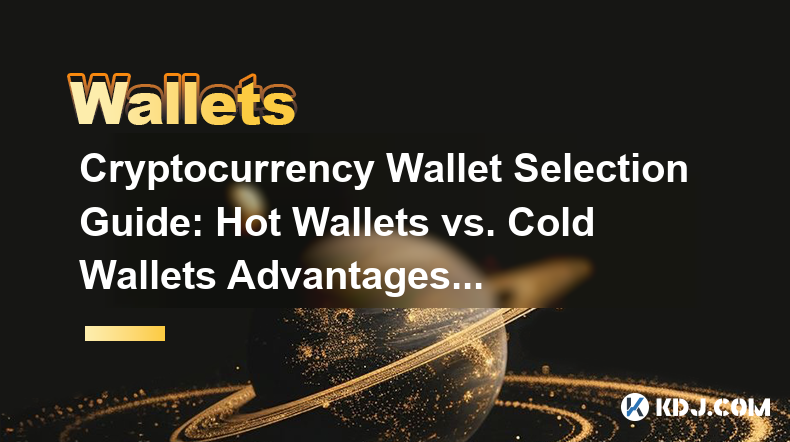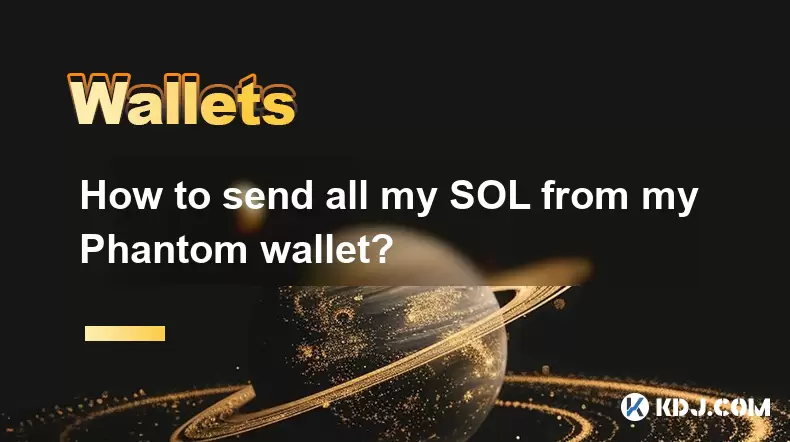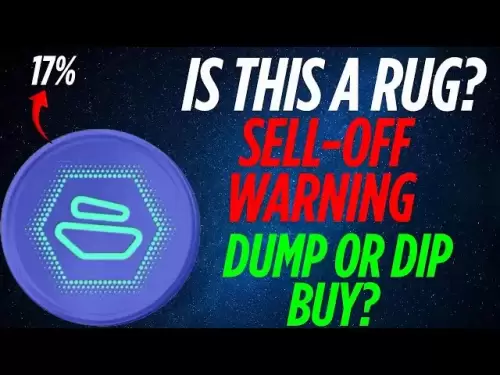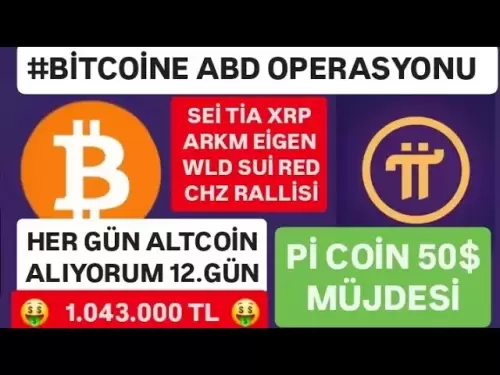-
 Bitcoin
Bitcoin $107,810.8710
-1.45% -
 Ethereum
Ethereum $2,531.4386
-1.75% -
 Tether USDt
Tether USDt $1.0000
-0.03% -
 XRP
XRP $2.2542
-0.99% -
 BNB
BNB $659.1350
-0.50% -
 Solana
Solana $148.5456
-2.40% -
 USDC
USDC $0.9999
-0.02% -
 TRON
TRON $0.2868
-0.44% -
 Dogecoin
Dogecoin $0.1666
-3.65% -
 Cardano
Cardano $0.5751
-2.36% -
 Hyperliquid
Hyperliquid $37.6845
-5.51% -
 Bitcoin Cash
Bitcoin Cash $494.9448
-0.65% -
 Sui
Sui $2.8396
-3.31% -
 Chainlink
Chainlink $13.2423
-2.59% -
 UNUS SED LEO
UNUS SED LEO $9.0482
0.02% -
 Stellar
Stellar $0.2467
-2.44% -
 Avalanche
Avalanche $17.8165
-3.63% -
 Shiba Inu
Shiba Inu $0.0...01158
-2.41% -
 Toncoin
Toncoin $2.7397
-3.42% -
 Hedera
Hedera $0.1560
-2.73% -
 Litecoin
Litecoin $85.8559
-2.34% -
 Monero
Monero $315.3710
-2.30% -
 Dai
Dai $1.0001
0.00% -
 Polkadot
Polkadot $3.3443
-2.03% -
 Ethena USDe
Ethena USDe $1.0001
0.01% -
 Bitget Token
Bitget Token $4.2888
-3.73% -
 Uniswap
Uniswap $7.3388
-1.57% -
 Aave
Aave $278.2986
-3.05% -
 Pepe
Pepe $0.0...09807
-3.67% -
 Pi
Pi $0.4563
-2.39%
Cryptocurrency Wallet Selection Guide: Hot Wallets vs. Cold Wallets Advantages and Disadvantages
Hot wallets offer convenience for frequent crypto transactions but are less secure, while cold wallets provide high security for long-term storage but are less convenient.
Apr 18, 2025 at 02:22 am

In the world of cryptocurrencies, securing your digital assets is paramount. One of the crucial decisions you'll face is choosing between hot wallets and cold wallets. Each type of wallet offers different advantages and disadvantages, tailored to different needs and security levels. This guide will delve into the specifics of both hot and cold wallets, helping you make an informed decision based on your individual requirements.
Understanding Hot Wallets
Hot wallets are digital wallets that are connected to the internet. They are designed for ease of use, making them ideal for everyday transactions and frequent trading.
Advantages of Hot Wallets
- Convenience and Accessibility: Hot wallets are easily accessible from any device with an internet connection. This makes them perfect for users who need to make frequent transactions or need quick access to their funds.
- User-Friendly Interface: Most hot wallets come with intuitive interfaces that make it easy for beginners to navigate and manage their cryptocurrencies.
- Integration with Exchanges: Many hot wallets are integrated directly with cryptocurrency exchanges, allowing seamless trading and transfer of assets.
Disadvantages of Hot Wallets
- Security Risks: Since hot wallets are connected to the internet, they are more vulnerable to hacking and cyber attacks. This makes them less secure compared to cold wallets.
- Dependence on Third Parties: Many hot wallets are provided by third-party services, which means you have to trust these providers with the security of your funds.
- Potential for Loss: If the service provider goes out of business or experiences technical issues, you could potentially lose access to your funds.
Understanding Cold Wallets
Cold wallets, on the other hand, are offline storage solutions for cryptocurrencies. They are not connected to the internet, which significantly increases their security.
Advantages of Cold Wallets
- Enhanced Security: Cold wallets are highly secure because they are not connected to the internet, making them immune to online hacking attempts.
- Control Over Private Keys: With cold wallets, you have complete control over your private keys, reducing the risk of third-party interference.
- Long-Term Storage: Cold wallets are ideal for long-term storage of cryptocurrencies, making them perfect for investors who do not need frequent access to their funds.
Disadvantages of Cold Wallets
- Less Convenient: Cold wallets are less convenient for everyday transactions because they require physical access to the device.
- Higher Initial Cost: Cold wallets, especially hardware wallets, can be more expensive to purchase compared to free or low-cost hot wallets.
- Learning Curve: Using a cold wallet often requires a better understanding of how cryptocurrencies work, which can be a barrier for beginners.
Choosing the Right Wallet for Your Needs
When deciding between a hot wallet and a cold wallet, consider the following factors:
- Frequency of Transactions: If you need to access your cryptocurrencies frequently, a hot wallet might be more suitable. For less frequent access, a cold wallet is preferable.
- Security Concerns: If security is your top priority, a cold wallet will offer the highest level of protection. If you're willing to trade some security for convenience, a hot wallet might be a better choice.
- Budget: Consider your budget. Cold wallets, particularly hardware wallets, can be more expensive upfront, while many hot wallets are available for free or at a low cost.
Types of Hot Wallets
Hot wallets come in various forms, each with its own set of features:
- Web Wallets: These are accessible via a web browser and are often provided by cryptocurrency exchanges. They are the most convenient but also the least secure.
- Mobile Wallets: These are apps installed on your smartphone, offering a good balance between convenience and security.
- Desktop Wallets: These are software programs installed on your computer, offering more security than web wallets but less than cold wallets.
Types of Cold Wallets
Cold wallets also come in different forms:
- Hardware Wallets: These are physical devices that store your private keys offline. They are highly secure and user-friendly, making them a popular choice for long-term storage.
- Paper Wallets: These involve printing out your private keys and public addresses on a piece of paper. They are very secure but can be cumbersome to use.
- Offline Software Wallets: These are software programs that you can use to generate and store your private keys offline. They offer a good level of security but require more technical knowledge.
Setting Up a Hot Wallet
Setting up a hot wallet is generally straightforward. Here's how you can do it:
- Choose a Hot Wallet: Select a reputable hot wallet that supports the cryptocurrencies you want to store. Popular options include Coinbase Wallet, Trust Wallet, and MetaMask.
- Download and Install: If it's a mobile or desktop wallet, download the app or software from the official website or app store.
- Create an Account: Follow the prompts to create an account. You'll typically need to provide an email address and set a password.
- Secure Your Wallet: Set up two-factor authentication (2FA) if available. This adds an extra layer of security to your wallet.
- Add Funds: Once your wallet is set up, you can add funds by transferring cryptocurrencies from an exchange or another wallet.
Setting Up a Cold Wallet
Setting up a cold wallet requires a bit more effort but offers greater security. Here's how to set up a hardware wallet:
- Choose a Hardware Wallet: Popular options include Ledger and Trezor. Purchase the device from the official website or an authorized reseller.
- Unbox and Connect: Unbox your hardware wallet and connect it to your computer using the provided USB cable.
- Initialize the Device: Follow the on-screen instructions to initialize the device. This usually involves setting a PIN and generating a recovery seed.
- Secure Your Recovery Seed: Write down the recovery seed and store it in a safe place. This is crucial for recovering your wallet if the device is lost or damaged.
- Install Wallet Software: Download and install the wallet software from the manufacturer's website. This software will allow you to interact with your hardware wallet.
- Add Funds: Once your hardware wallet is set up, you can transfer cryptocurrencies to it from an exchange or another wallet.
Frequently Asked Questions
Q: Can I use both a hot wallet and a cold wallet?
A: Yes, many cryptocurrency users employ a strategy known as "cold storage for the majority, hot storage for the minority." This means keeping the bulk of their funds in a cold wallet for security and a smaller amount in a hot wallet for everyday transactions.
Q: How do I know if a wallet is secure?
A: Look for wallets that have been audited by reputable security firms, have a strong track record of security, and offer features like two-factor authentication and multi-signature support. Additionally, always download wallets from official sources to avoid malware.
Q: What should I do if I lose my cold wallet?
A: If you lose your cold wallet, you can recover your funds using the recovery seed you wrote down during setup. It's crucial to keep this seed in a secure location, as anyone with access to it can control your funds.
Q: Are there any fees associated with using hot and cold wallets?
A: Hot wallets may charge transaction fees when you send or receive cryptocurrencies, and some may have fees for certain features. Cold wallets typically do not have fees for storing cryptocurrencies, but you may incur transaction fees when moving funds to or from the wallet.
Disclaimer:info@kdj.com
The information provided is not trading advice. kdj.com does not assume any responsibility for any investments made based on the information provided in this article. Cryptocurrencies are highly volatile and it is highly recommended that you invest with caution after thorough research!
If you believe that the content used on this website infringes your copyright, please contact us immediately (info@kdj.com) and we will delete it promptly.
- Meme Coins 2025: Presale Surge and ETF Hopes?
- 2025-07-08 12:30:11
- Gate.io, Pump.fun, and the Mysterious Token Sale: What's the Deal?
- 2025-07-08 12:30:11
- Pi Coin Price Prediction Today: Is a Breakout Imminent?
- 2025-07-08 12:50:11
- XRP, Breakout, and Altcoins: Navigating the Crypto Rollercoaster
- 2025-07-08 12:50:11
- BlockDAG Leads the Web3 Race with Sports Partnerships and Strategic Pricing
- 2025-07-08 10:50:12
- Pepe, Dogecoin, Shiba Inu: Meme Coin Mania or Calculated Crypto?
- 2025-07-08 10:30:12
Related knowledge

How to cancel a pending transaction in Phantom wallet?
Jul 03,2025 at 07:21pm
Understanding Pending Transactions in Phantom WalletA pending transaction in the Phantom wallet occurs when a user initiates a transfer or interaction with the Solana blockchain, but it hasn't yet been confirmed by the network. This can happen due to various reasons such as low transaction fees, network congestion, or incorrect gas settings. It's import...

How to see the estimated value of my tokens in Phantom wallet?
Jul 04,2025 at 12:21am
What is Phantom Wallet?Phantom wallet is one of the most popular cryptocurrency wallets designed for the Solana blockchain. It allows users to store, send, receive, and manage various tokens built on Solana, including SPL tokens and NFTs. The wallet offers a user-friendly interface, making it accessible for both beginners and advanced users in the crypt...

How to lock my Phantom wallet extension?
Jul 03,2025 at 11:14am
What Is the Phantom Wallet and Why Lock It?The Phantom wallet is a popular non-custodial cryptocurrency wallet designed for interacting with the Solana blockchain. Supporting both browser extensions and mobile apps, Phantom allows users to store, send, receive, and stake SOL tokens, as well as interact with decentralized applications (dApps). Securing y...

Does Phantom wallet offer two-factor authentication (2FA)?
Jul 03,2025 at 09:00am
Understanding Phantom Wallet and Its Security FeaturesPhantom wallet is a widely used non-custodial cryptocurrency wallet that supports the Solana blockchain. It allows users to store, send, receive, and interact with decentralized applications (dApps) seamlessly. As security is a top priority for any crypto wallet user, security features like two-facto...

How to send all my SOL from my Phantom wallet?
Jul 06,2025 at 10:00am
Preparing to Send SOL from Your Phantom WalletBefore initiating any transaction, it is crucial to ensure that your Phantom wallet is fully set up and connected to the correct network. Phantom supports multiple networks, but for sending SOL, you must be on the Solana blockchain. Confirm this by checking the network indicator in the top-right corner of th...

What is "rent" on Solana and how does it affect my Phantom wallet?
Jul 02,2025 at 08:35pm
Understanding 'Rent' on SolanaIn the context of Solana, the term 'rent' refers to a storage fee that users pay for maintaining data on the blockchain. Unlike Ethereum, where storage costs are paid once via gas fees during contract deployment, Solana implements a recurring cost model to ensure efficient usage of network resources. This means that any acc...

How to cancel a pending transaction in Phantom wallet?
Jul 03,2025 at 07:21pm
Understanding Pending Transactions in Phantom WalletA pending transaction in the Phantom wallet occurs when a user initiates a transfer or interaction with the Solana blockchain, but it hasn't yet been confirmed by the network. This can happen due to various reasons such as low transaction fees, network congestion, or incorrect gas settings. It's import...

How to see the estimated value of my tokens in Phantom wallet?
Jul 04,2025 at 12:21am
What is Phantom Wallet?Phantom wallet is one of the most popular cryptocurrency wallets designed for the Solana blockchain. It allows users to store, send, receive, and manage various tokens built on Solana, including SPL tokens and NFTs. The wallet offers a user-friendly interface, making it accessible for both beginners and advanced users in the crypt...

How to lock my Phantom wallet extension?
Jul 03,2025 at 11:14am
What Is the Phantom Wallet and Why Lock It?The Phantom wallet is a popular non-custodial cryptocurrency wallet designed for interacting with the Solana blockchain. Supporting both browser extensions and mobile apps, Phantom allows users to store, send, receive, and stake SOL tokens, as well as interact with decentralized applications (dApps). Securing y...

Does Phantom wallet offer two-factor authentication (2FA)?
Jul 03,2025 at 09:00am
Understanding Phantom Wallet and Its Security FeaturesPhantom wallet is a widely used non-custodial cryptocurrency wallet that supports the Solana blockchain. It allows users to store, send, receive, and interact with decentralized applications (dApps) seamlessly. As security is a top priority for any crypto wallet user, security features like two-facto...

How to send all my SOL from my Phantom wallet?
Jul 06,2025 at 10:00am
Preparing to Send SOL from Your Phantom WalletBefore initiating any transaction, it is crucial to ensure that your Phantom wallet is fully set up and connected to the correct network. Phantom supports multiple networks, but for sending SOL, you must be on the Solana blockchain. Confirm this by checking the network indicator in the top-right corner of th...

What is "rent" on Solana and how does it affect my Phantom wallet?
Jul 02,2025 at 08:35pm
Understanding 'Rent' on SolanaIn the context of Solana, the term 'rent' refers to a storage fee that users pay for maintaining data on the blockchain. Unlike Ethereum, where storage costs are paid once via gas fees during contract deployment, Solana implements a recurring cost model to ensure efficient usage of network resources. This means that any acc...
See all articles

























































































